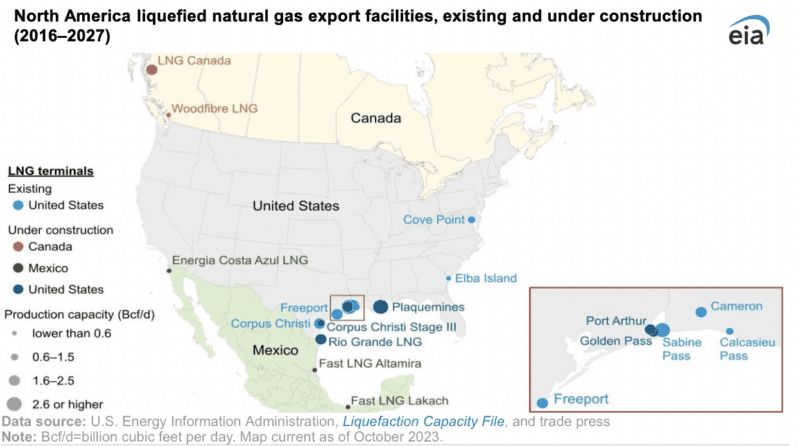orth America’s liquefied natural gas (LNG) export capacity is set to more than double by the end of 2027 with the addition of new LNG export terminals in Mexico and Canada, as well as the expansion of existing LNG capacity in the United States, the U.S. Energy Information Administration said.
Ten projects across the three countries will contribute to the expansion of LNG export capacity to 24.3 billion cubic feet per day (Bcf/d) by the end of 2027, up from 11.4 billion (Bcf/d) currently.
In the United States alone, five LNG export projects are currently under construction, accounting for a combined capacity of 9.7 Bcf/d. These projects include Golden Pass, Plaquemines, Corpus Christi Stage III, Rio Grande, and Port Arthur, with the first exports expected in 2024.

Mexico is also making strides in LNG exports, with three projects currently under construction. Fast LNG Altamira offshore and onshore, as well as Fast LNG Lakach, are set to contribute a combined capacity of 1.1 Bcf/d. The Altamira project consists of three units, with the first unit planned for offshore and the other two to be installed onshore at the Altamira LNG regasification terminal. Fast LNG Lakach will be installed offshore of Veracruz, Mexico. The Energia Costa Azul LNG terminal in Baja California is also undergoing construction, with a Phase 1 capacity of 0.4 Bcf/d and a proposed Phase 2 capacity of 1.6 Bcf/d.
Canada is not far behind, with two LNG export projects currently under construction in British Columbia. LNG Canada, with an export capacity of 1.8 Bcf/d, is expected to begin service in 2025, while Woodfibre LNG, with an export capacity of 0.3 Bcf/d, is scheduled for 2027. Additionally, the Canada Energy Regulator has authorized 18 more LNG export projects, with a combined capacity of 29 Bcf/d.
The expansion of LNG export capacity comes as the Panama Canal, which opened to LNG carriers with its expansion in 2016, faces a freshwater shortage that will limit the capacity of the waterway as long as the drought in Panama continues.